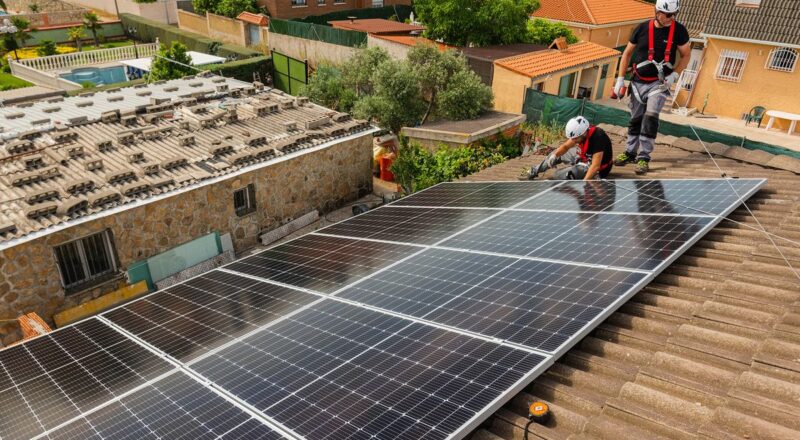Solar panels are an investment in clean and renewable energy, and proper maintenance is essential to ensure their optimal performance and longevity. By regularly maintaining your solar panel system, you can maximise energy production, extend the lifespan of the panels, and protect your investment. In this article, we will provide you with valuable tips and tricks for solar panel maintenance.
Why is Solar Panel Maintenance Important?
Solar panel maintenance is crucial for several reasons:
- Optimal Performance: Regular maintenance ensures that your solar panels are operating at their maximum efficiency. Dust, dirt, leaves, or other debris can accumulate on the surface of the panels, reducing sunlight absorption and energy production. Cleaning and inspecting the panels help maintain their performance and maximise electricity generation.
- Longevity: Proper maintenance can extend the lifespan of your solar panels. By detecting and addressing potential issues early on, you can prevent further damage and ensure the panels continue to function properly for their expected lifespan, which is typically 25 to 30 years or more.
- Safety: Solar panel maintenance includes inspecting the electrical components, wiring, and connections. Regular inspections can identify any potential electrical hazards or malfunctions, ensuring the safety of your solar panel system.
- Solar Panel Maintenance Checklist
Follow this solar panel maintenance checklist to keep your system in top condition:
Regular Cleaning: Clean the solar panels periodically to remove dirt, dust, bird droppings, leaves, or any other debris that may accumulate on the surface. This build-up can reduce the amount of sunlight reaching the solar cells and decrease energy production. Cleaning the panels helps maintain their efficiency.
To clean the panels:
Check the manufacturer’s guidelines for any specific cleaning instructions or restrictions.
Wait for the panels to cool down before cleaning or clean them early in the morning or late in the evening when they are less hot.
Use a soft brush, sponge, or cloth to gently remove the debris. Avoid abrasive materials or harsh chemicals that may scratch or damage the panels.
If necessary, use water to rinse the panels after cleaning. Avoid using high-pressure water sprays that may damage the panels or the wiring.
Inspect for Damage: Regularly inspect the solar panels for any signs of damage, such as cracks, scratches, or chips on the surface. Damaged panels may not function optimally and may require professional solar panel repairs or replacement.
To inspect the panels:
Conduct visual inspections from the ground or a safe location. Avoid walking on the panels or putting weight on them, as this can cause damage.
Look for any visible signs of damage or wear, including physical damage, discolouration, or loose connections.
If you notice any damage or suspect a problem, contact a professional solar panel technician to assess and address the issue.
Check for Shading: Shading can significantly impact the performance of your solar panels. Observe the panels throughout the day to ensure there are no shadows cast on them from nearby trees, buildings, or other obstructions. Shading reduces the amount of sunlight reaching the panels, leading to decreased energy production.
If shading is an issue:
Trim or prune nearby trees or vegetation that cast shadows on the panels. Consult with a professional arborist or landscaper if necessary.
Consider repositioning the panels, if possible, to avoid shading issues.
If shading cannot be completely avoided, explore technologies such as microinverters or power optimisers that can optimise energy production even in shaded conditions.
Monitor Performance: Take advantage of the monitoring tools provided with your solar panel system. Regularly check the performance data, including energy production, to ensure it aligns with expectations. Monitoring allows you to detect any deviations or performance issues promptly.
If you notice any performance issues:
Analyse the monitoring data to identify any patterns or abnormalities.
Consult with your solar panel installer or a professional technician to assess and troubleshoot the issue.
If necessary, schedule maintenance or repairs to restore optimal performance.
- Maintain a Clear Surrounding Area: Ensure the area around your solar panels is clear of any obstructions that may interfere with their performance or pose safety risks. Remove leaves, branches, snow, or debris that may accumulate around the panels.
- Inspect Electrical Connections: The electrical connections of your solar panel system should be regularly inspected to ensure they are secure and free from corrosion or damage. Faulty connections can disrupt energy production and pose safety hazards.
To inspect electrical connections:
Turn off the system or seek professional assistance if you are not familiar with electrical work.
Visually inspect the wiring, junction boxes, and connectors for any signs of loose connections, corrosion, or damage.
If you notice any issues or suspect a problem, contact a qualified electrician or solar panel technician to address the electrical concerns.
- Be Mindful of Roof Maintenance: If your solar panels are installed on the roof, be mindful of any roofing maintenance or repair work that may be conducted. Inform roofing contractors about the presence of solar panels to avoid any accidental damage or disconnection of the panels during roof repairs.
- Professional Maintenance and Servicing
While regular maintenance can be performed by homeowners, it is recommended to schedule periodic professional maintenance and servicing for your solar panel system. Professional technicians have the expertise, experience, and necessary equipment to perform comprehensive inspections, identify potential issues, and ensure your system operates optimally.
Professional maintenance may include:
- Comprehensive Inspection: A professional technician will conduct a detailed inspection of your solar panel system, including the panels, wiring, connections, inverters, and other components. They will check for any signs of wear, damage, or performance issues.
- Cleaning: Professionals may use specialised cleaning equipment and techniques to effectively clean your solar panels, ensuring maximum efficiency.
- Electrical Testing: Electrical testing is conducted to ensure the system’s electrical components are functioning correctly and safely. This may include checking voltages, and currents, and verifying the integrity of the electrical connections.
- Inverter Maintenance: Inverters may require periodic maintenance or firmware updates to ensure their optimal performance. Professionals can handle these tasks and troubleshoot any inverter-related issues.
- Warranty Compliance: Professional maintenance can help ensure compliance with warranty requirements. Some manufacturers or installers may require regular servicing to maintain warranty coverage.
- System Performance Optimisation: Professionals may assess the overall system performance, analyse monitoring data, and recommend any adjustments or optimisations to improve energy production and efficiency.
- Safety Considerations
When performing solar panel maintenance, it is essential to prioritise safety. Keep the following safety considerations in mind:
- Safety Gear: Wear appropriate personal protective equipment (PPE) such as gloves, safety glasses, and non-slip footwear when working with solar panels. This protects against potential hazards and ensures your safety during maintenance activities.
- Electrical Safety: Exercise caution when inspecting electrical connections or handling electrical components. If you are unsure about any electrical work, seek professional assistance.
- Working at Heights: If you need to access the solar panels for cleaning or maintenance, use proper fall protection equipment and follow safety guidelines when working at heights. Avoid walking directly on the panels, as this can cause damage.
- Turn off the System: If you need to perform any maintenance that requires turning off the solar panel system, follow the manufacturer’s guidelines or seek professional assistance.
- Conclusion
Regular maintenance is crucial for optimal performance, longevity, and safety of your solar panel system. By following the maintenance tips and tricks provided by Solar Panels Malaga, you can ensure that your solar panels continue to generate clean and renewable energy efficiently. Remember to clean the panels regularly, inspect for damage, avoid shading, monitor performance, and schedule professional maintenance when needed. By taking care of your solar panels, you protect your investment and contribute to a sustainable future of clean energy. – If you’re looking for the best Air Conditioning Sotogrande has to offer, look no further.

